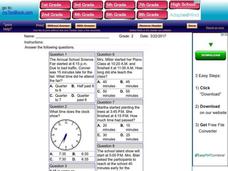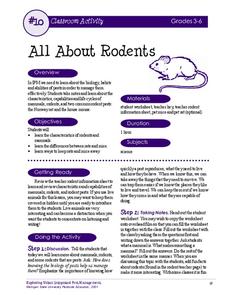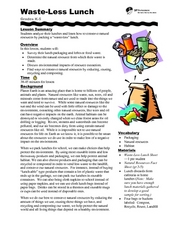Baylor College
Heart Rate and Exercise
What is the relationship among the heart, circulation, and exercise? Your class members will explore first-hand how different physical exercises affect an individual's heart rate. They will begin by learning how to measure their own...
Baylor College
HIV/AIDS in the United States
In the final of five lessons about HIV/AIDS, groups create presentations to share data about the infection rates in the United States, examining demographic and geographic trends over the past ten years. Depending on how much time you...
Curated OER
Garbage in the Garden
Students create their own compost. In this soil lesson, students fill a bag with waste and soil, in order to create a mini compost bin. Students observe the baggies over a 6 week period, they record their findings and collect data...
Carson-Dellosa Publishing
Boho Birds Bulletin Board
Maybe you're studying the life cycle of a bird, or maybe you're doing an author study in language arts. Whatever the case may be, use a set of bulletin board ideas any time of the year. Tailor the provided ideas to make them your...
Curated OER
A Better Class of Journal-ists
Young academics create a current events journal by skimming newspapers for articles that fit defined guidelines for informational texts. After cutting out two articles each week to add to their journals, they write a brief description of...
Berkshire Museum
Meet a Naturalist: Researching, Writing, Interviewing
Young scholars reach out into the community and learn about different environmental science careers in this inquiry-based instructional activity. Beginning with a short research assignment, children gain background knowledge about...
Center for Learning in Action
Water—Changing States (Part 1)
Here is part one of a two-part lesson in which scholars investigate the changing states of water—liquid, solid, and gas. With grand conversation and up to three demonstrations, learners make predictions about what they think will happen...
Michigan State University
Preferred Destinations
Pests vacation, too! Here, scholars create travel brochures or posters that inform others about a habitat in which a pest lives. Travel information to be included contains everything from pictures to resort names to slogans...
Boys Town
More Tools for Teaching Social Skills in School
Put an end to wasted instructional time with this lesson on responsibility and preparedness. After completing this series of activities young scholars will learn the importance of these social skills not only in the classroom,...
Curated OER
Plate Tectonics: Third Grade Lesson Plans and Activities
Third graders examine plate movements and boundaries with a lab that demonstrates how volcanoes and earthquakes are formed. It presents different types of stresses an object can withstand through a hands-on...
Curated OER
Time Management
Students record their daily activities and graph the results using the educational software program called Inspiration. This lesson is intended for the upper-elementary classroom and includes resource links and activity extensions.
National Park Service
Living & Non-Living Interactions
What better way to learn about ecosystems than by getting outside and observing them first hand? Accompanying a field trip to a local park or outdoor space, this series of collaborative activities engages children in...
Curated OER
Locating Information Quickly in a Variety of Resources
Here is a lesson which may be best suited for a library science teacher, or one that can be done by a regular teacher when in the library. In it, learners explore the best ways to use print and electronic resources to find information...
Curated OER
My Test Book: Telling Time
In this math skills worksheet, students solve 10 multiple choice math problems that require them to read clocks and calculate lapsed time. Students may view the correct answers.
Curated OER
Wasting Times
Learners examine Britain's waste management proposals. In this environmental stewardship lesson plan, students visit linked websites to gain an understanding of proposals to reduce waste in the nation.
Curated OER
Applied Science - Built Environment Lab
Students evaluate trash. In this Science lesson, students collect and weigh trash from their classrooms. Students categorize the trash and the corresponding weights, recording the information on a data sheet.
Michigan State University
All About Rodents
Get to the know the common house mouse and the Norway rat with an activity that reinforces reading comprehension skills. Scholars read a three-page document detailing key information about mammals, specifically rodents, and use their...
Michigan State University
Friend or Foe?
What one person thinks is a pest may not be a pest to someone else. Here, scholars examine the characteristics of living things and pests through grand conversation and a variety of activities. Class members play a game of pest or not a...
Michigan State University
Create an Animal
Think beyond the animals and habitats we've already discovered and allow scholars to dream up their very own habitat and an animal that lives there. Class members present the new habitat and animal on a poster alongside an...
Science Matters
Crawly Composters
Get your hands dirty with an interactive lesson that showcases the process of decomposing and returning nutrients back into the soil. After building a compost pile, pupils regularly observe the...
Curated OER
Earthquakes: Third Grade Lesson Plans and Activities
Introduce third graders to energy waves with a hands-on geology activity, in which they answer questions and compare seismograms in the San Francisco Bay area. After a demonstration that shows how bigger waves indicate a...
Curated OER
4-H Poultry Activity Page: Responsiblity
How many eggs does a chicken lay annually? A poultry project gets 4-H members experiencing the importance of responsibility and care of animals. They read about managing poultry and working with eggs, write a story about their flock,...
SF Environment
Waste-Less Lunch
Is it possible to have a waste-less lunch? Can your class become leaders in conservation? Discuss the importance of reducing waste during lunch time with a fun instructional activity that can be extended to everyday practices. First the...
Curated OER
Home Living/ Daily Living: Food Pyramid
What did you have for lunch? Did it contain all four food groups? Help your special education class make good food choices and recognize foods in each of the four food groups. They look at images and discuss the foods on the food pyramid...























